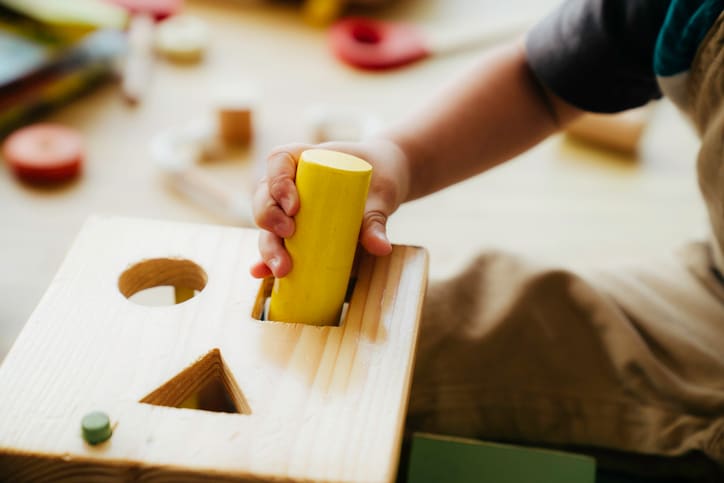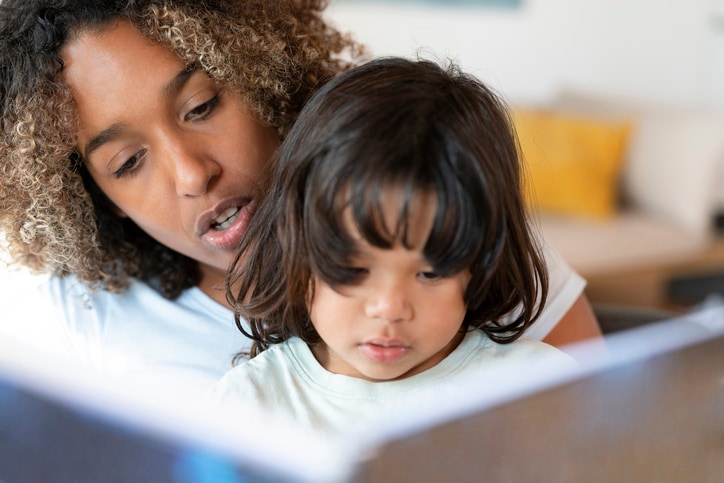Some preschoolers may be able to name the colors of the rainbow, know their nose from their toes and be tackling their ABCs. However, if they’re is struggling with learning shapes, there are ways you can help them learn. Sure, you could sit your little one down to a deck of boring flash cards with shapes, but consider playing these fun shape games first.
Lauren Hunt, a teacher and creator of the blog Teacher Types, says, “The keys to engaging children in learning at home is fun and play! For young children especially, avoid structure and formal lessons. The child may not even realize they are learning while playing and enjoying themselves.”
Learning through a game packs a playful punch when it comes to building shape recognition skills. Here are seven fun games you can play together to master shapes:
1. Shape up
Get up and get moving! Engage kids’ bodies along with their minds in this partner geometry game. Use a cube-shaped gift box to craft your own extra-large die and then draw a simple shape on each side. Have kids take turns rolling the die, and ask them to figure out ways to move and bend their bodies into the shapes, working together if necessary.
2. Hop to it
The national early childhood organization Zero to Three suggests that children as young as 2 or 3 learn shapes with simple movement games. Make over-sized paper shapes, secure them to the floor with tape and call out a name (such as square or rectangle) for kids to hop on. Can they get from shape to shape without touching the floor?
3. Set a scene
Some kids may be able to puzzle together a few random shapes to create a picture, but can they do it with something other than paper? Test those fine motor skills by having them make three-dimensional shapes out of soft modeling clay. After they have a few shapes going, challenge them to create a picture using them. For example, stack a pyramid atop a cube to make a house before adding a rectangular chimney. Let kids explore the building process and create their own make-believe faces or buildings.
Hunt says, “Open-ended, hands-on, play-based experiences are more likely to engage and motivate children; therefore, they are more likely to learn!”
4. Sort the shape
For the child who’s already got the toy shape sorter figured out, putting the cube into the square hole, consider taking things up a notch. Take this everyday playtime activity and turn it into something more challenging. Play shape games as you put away the dishes or clean up the toys: sort circular plates by size or stack books from smallest rectangle to biggest.
Faith Collins, an early childhood educator and creator Joyful Toddlers, an online resource for parents and early childhood educators, says, “Toddlers long to be involved in parents’ household tasks, and when we can incorporate them into activities that they see us doing regularly, then they know that they are making a difference.”
5. Take an artsy adventure
Art is packed full of shapes, but you don’t need to go to the museum to see them. Print out an image of a famous piece of art, and ask the child to spy specific shapes in the masterpiece. Have them circle the shapes as they names each one. Try a variety of works, ranging from easy-to-spy cubist art to landscapes or portraits.
6. Match magazine shapes
Break out the shape stickers, or make your own by cutting mailing labels into circles, squares, triangles, diamonds and rectangles. Page through kid-friendly magazines and have kids stop and put a shape sticker on the pictures when they see a matching shape. A smiling face gets a circle sticker and a photo of a book gets a square. Activities like this can help little ones see shapes everywhere they go!
7. Hunt for shapes
Reuse cardboard from an old box and cut a few shapes out that are about the size of your hand. Bury them in a sandbox or sand table and have kids dig through to uncover the buried shapes. Set a timer to make the game more of a challenge. When they’re done, have them name the geometric forms that they’ve discovered.





